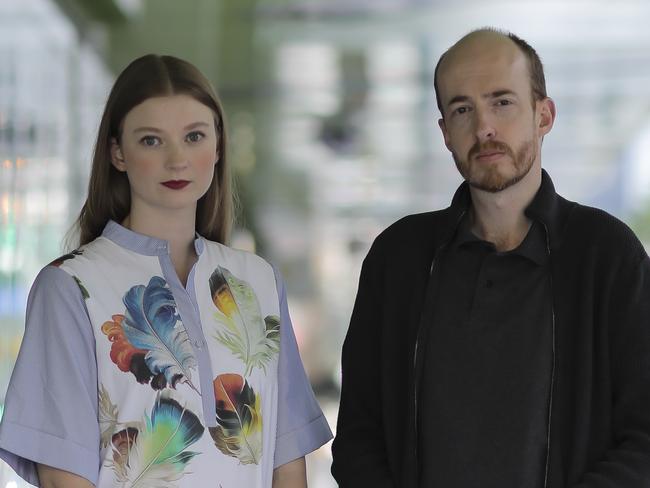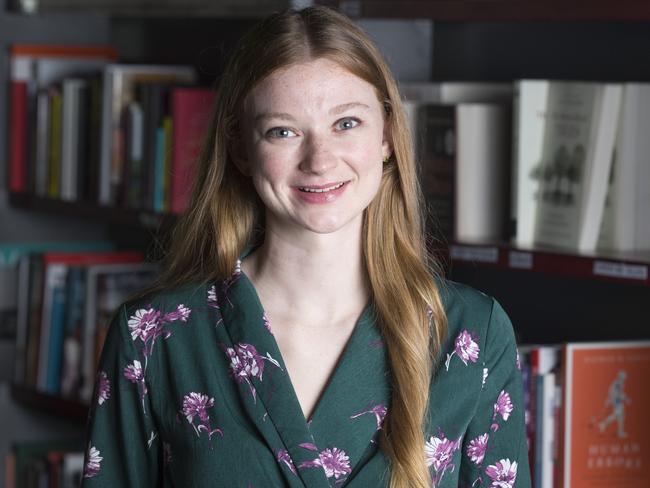The few seconds and hair touch that let a rapist go free
During her years in court, Bri Lee heard this outrageous defence for rape countless times. But there was one case that made her furious.

For years, Bri Lee served as a judge’s associate in Queensland’s District Court, listening to hundreds of men accused of rape trot out an “outrageous” defence for their actions.
In Queensland, it is not enough for sexual assault survivors to say they did not consent.
This is because people accused of rape can immediately argue the “mistake of fact” defence, a century-old, outdated law from the state’s criminal code.
In essence, the law allows defendants to argue they had an honest and reasonable — but mistaken — belief the person had consented to having sex.
Legal experts say it is an outdated and confusing defence grounded in the way society behaved in the 19th century.
Sexual assault advocates take it one step further and say the law is the best and easiest way rapists can keep themselves out of jail and conviction-free.
For decades, Queenslanders accused of rape have relied on the defence.
There are documented cases in Queensland’s courts where a man successfully argued he believed the woman had consented even though her evidence was that she:
• Was too drunk to say no
• Was asleep at the time they had sex
• Was not proficient enough in English to say no
• Had mental disabilities that stopped her from forming the words to say no or fight off advances
• Was threatened or beaten until she submitted to sex to save her own life.
After months of campaigning, Ms Lee said she was “in tears” yesterday when Queensland Attorney-General Yvette D’Ath announced a review into consent and mistake of fact rape cases.
The government has referred the issue to the state’s Law Reform Commission.
But with a report due back to the government early next year, law reform advocates say there’s still a long way to go before mistake of fact is wiped from Queensland’s criminal code.
The law has been denying women justice for years. For Ms Lee, it was a case involving Jessica* that especially stuck with her.
It also happened to be the first time Ms Lee, an author and sexual assault advocate, heard the mistake of fact defence.
In her book Eggshell Skull, Ms Lee runs through the case — Jessica’s second trial after the jury failed to reach a verdict the first time.

A few weeks after allegedly raping Jessica while she slept, the man fled Brisbane and, believing a counsellor in NSW would have to keep it confidential, confessed to the crime.
“I remember he was above me … because … he was supporting all his weight on his arms. Like, above me. So that he wasn’t touching me or bumping me, you know. Apart from down there,” Jessica told the court, as told by Ms Lee.
Bewildered and still waking up, Jessica believed the man on top of her was her ex-boyfriend and didn’t immediately push him off.
In court, Jessica was questioned about how much alcohol she’d drank, the length of her skirt and what medication she was on.
“She wouldn’t be the first or last man or woman to regret what was done under the grip of intoxication,” the defence barrister told the court.
The barrister was pushing a mistake of fact defence for his client, arguing the man had an honest and reasonable belief Jessica had consented to sex.
“It gives juries an easy reason to acquit,” Ms Lee wrote in Eggshell Skull.
“They can say, ‘Sorry love, you didn’t ask for this’ but simultaneously, ‘He’s not responsible for his actions.’”
After a full day of deliberation, the jury failed to reach a verdict. The case was again declared a mistrial.
Ms Lee worried that Jessica, who had already struggled through two jury trials, wouldn’t be strong enough for a third.
Ms Lee, a sexual assault survivor herself, reflected on Jessica’s case years after featuring it in her book and said the circumstances of women being asleep were “terrifyingly common”.
“When she woke up, she realised that a man’s penis was inside her and she reached up and touched his hair and that’s when she realised that it was not her ex-boyfriend,” Ms Lee told news.com.au.
“As soon as that happened, she called out but because there was that moment, on her evidence, where she was becoming conscious and reached up and touched him, that was enough of a grey zone for the defence to argue that her behaviour in being sort of sleepy but touching him gave him an honest and reasonable belief that she was consenting.
“But as far as I’m concerned, if you’re asleep and they insert a part of their body into yours, the rape has already occurred. It’s outrageous.”
In Queensland, it is not enough for sexual assault survivors to say they didn’t consent.
A number of advocacy groups — including the Queensland Women’s Legal Service, Professor Jonathan Crowe from Bond University and Ms Bri Lee — have been pushing Ms D’Ath for a response for years.
And yesterday afternoon, she finally took action.
“The (government) has a proud record of law reform in the area of sexual violence and supporting victims,” the Attorney-General tweeted.
“The Qld Law Reform Commission will be tasked with reviewing the matter of consent and mistake of fact in rape cases and report back to govt early next year.
“Referring this issue to the Queensland Law Reform Commission gives an opportunity for all voices to be heard as there are many views on this matter and it takes the politics out of this important matter.
“Any potential change should be based on evidence after expert advice.”

Speaking to news.com.au, Ms Lee said cases where mistake of fact was used were akin to “David and Goliath battles”.
“(Mistake of fact) is probably just one of the things I saw play out in the courtrooms that struck me as so unfair,” Ms Lee said.
Ms Lee, a Brisbane local, has spent the past year researching the law with Bond University’s Professor Jonathan Crowe, who himself has studied it for the past decade.
Ms Lee said she “genuinely believes” a change in mistake of fact would send shockwaves through the state’s justice system on every level.
“A lot of survivors tell me they feel discouraged after speaking to police at that first stage,” Ms Lee said.
“Sometimes that could be because police know there is such a slim chance of conviction that they believe they are giving sound advice when they tell them to seriously consider if they want to proceed.
“Police know it will take three years at least to get to court so they are sort of stuck in terms of not wanting to give people an inflated sense of possibility or promising but the question is, how do you manage expectations while still being encouraging?”
Ms Lee said her years as a judge’s associate, and seeing the dozens of sexual assault cases where mistake of fact was used was “disheartening and disillusioning”.
She described the defence as a way juries could “wipe their hands of having to make a harder decision”.
“If we didn’t have a defence like this, if juries saw the complainant and believed her, believed she was raped, they would have to pay a lot more attention to that rather than dismissing it.”

Critics of scrapping mistake of fact say doing so would unfairly shift the onus of proof onto accused rapists.
But Ms Lee is optimistic Queenslanders will one day be thankful the law was modernised.
“A really good reminder for people is a while ago, not very long ago, defence barristers were allowed to cross-examine women on how promiscuous they were and use it for the defendant to say she was easy and consenting,” Ms Lee said.
“At every stage of updates around sex offences, there is always alarm by certain groups that it’s going too far and yet within a few years, most of society looks back with relief on how incrementally we are improving things.
“My belief is making amendments to the defence will have an overwhelmingly positive effect on how our justice system treats sex crimes and I have enough faith in our justice system that it will not result in unfair verdicts because we still have a myriad of failsafes that will never be compromised.”
In the past 10 years, Queenslanders have made countless attempts to get the law reviewed.
The lack of action made Ms Lee “livid”, she said.
“I’m exhausted. I don’t want to be doing this. I stopped doing law because this stuff makes me upset and angry,” she said last month.
“I don’t enjoy spending my days doing legal research into heinous sex crimes, research that is necessary to add legitimacy.”
Ms Lee said last month she was hopeful there would be a review called after hearing murmurs among female MPs in the state’s Labor government.
“We’re not just crazy people on the outside anymore,” she said.
Have you been impacted by the mistake of fact defence? Email natalie.wolfe@news.com.au
* Not her real name

